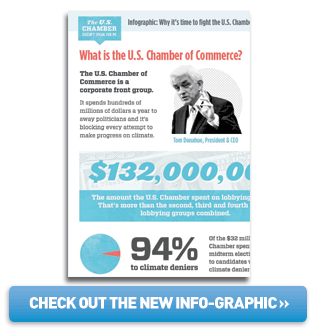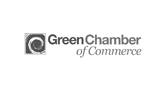Complete Recruitment Toolkit
With your help, we’re going to ensure that the U.S. Chamber’s dirty money becomes as toxic to politicians as Big Tobacco money is today. In order for that to happen, we’re asking organizers nationwide to recruit local businesses to declare “The U.S. Chamber Doesn’t Speak for Me.”
Before you start collecting business declarations, make sure you’ve already given your local chamber a call using the phone scripts that we provided. When you call, your local chamber will either agree to cancel their membership and/or make a public statement in opposition to the U.S. Chamber, or they won’t. If they refuse, it’s time to start recruiting businesses, to build up local support and a strong case for why the local chamber should disassociate.
Now that you’ve called your local chamber, take a look at the following suggestions and best practices for recruiting local businesses:
A good place to start is by contacting small businesses that you already have a relationship with, and then going on to larger and/or iconic businesses in your community. The more employees the business has, the better!
When calling or visiting business owners, try to keep the conversation short and simple—it’s better to not overwhelm the business owner with too many details or statistics. Also, try to personalize the interaction as much as possible—use your own experiences and energy to get the business owner excited about this campaign.
Keep in mind that not every business owner you contact will respond or want to make the declaration. You can expect that roughly 1/4 of the owners that you reach out to will sign on—for example, for every 40 business owners that you e-mail, call or canvass, expect that only 10 will sign on.
Check your local chamber’s website to see if they have a directory of local business members. Those directories will often have business names, phone numbers, and e-mails listed. Getting sign-ons from businesses that are members of the local chamber can have a greater impact.
The US Chamber of Commerce claims to speak for 3 million members—average Americans running small and large businesses alike—but in truth they only represent 300,000, and just 16 companies comprised 55% of their revenue in 2009.
The U.S. Chamber has lost its credibility and has come under scrutiny for a variety of unethical and unjust business practices: defending the Wall street pay practices that contributed to the financial crisis, running false ads on health care/financial reform/lawsuit abuse, and spending obscene amounts of money to deregulate federal environmental protections and question well-established climate science, all in the name of huge profits for its biggest contributors.
Many large corporations, including Apple, Nike and PG&E, have already quit the chamber, and many local chambers have already distanced themselves from the U.S. Chamber as well because of their inflated membership numbers, extreme right-wing rhetoric and anti-climate policies. The CEO of the Greater New York Chamber of Commerce has stated: “They don’t represent me.”
We suggest engaging a set of allies in your work. We’ve been working with a number of national allies who have local affiliates eager to work with you.
First, try reaching out to a local Merchants Association. If you can begin your conversation with a business owner by stating that you’re partnered with (or have the blessing of) their local Merchant Association, your cause will seem that much more credible.
Here are some more ideas to get you started:
- Lions Clubs: This year Lions Clubs across the country are making climate change a theme of their work. This campaign is an opportunity to meet business leaders within the Lions Club and encourage them to sign the declaration. # Students: Our partners at the Alliance for Climate Education work with high school students who are charged up to get active. Consider working with young people during your local business canvass.
- Faith Groups: Many communities of faith count themselves as part of the 350 community, and would make excellent partners as you seek to build citywide support for a local Chamber speaking up against the US Chamber.
- Providers of Food: Many farmers, restaurant owners, and producers of food products, will be just the kinds of business owners likely to sign the declaration. We work with groups like Slow Food and businesses like Organic Valley, who can be partners for your work.
- Bicycle Coalitions: A large number of 350 supporters are avid proponents of the bicycle as a carbon-free method of transportation, and are also members of bicycle coalitions. Reaching out to your local bike coalition and bike shops will be an effective way to garner additional support from community members and businesses interested in renouncing the US Chamber.
You can suggest to the owner that you want this campaign to be beneficial for their business, and that you can organize your local group to specifically patronize the first businesses to sign the declaration. You can use the Carrotmob approach—one we’ve found to be particularly useful.
Offer them a window cling for their storefront (similar to a Yelp sticker). If you need window clings, send an e-mail to chamber@350.org with your address and we’ll put some in the mail for you right away.
Tell the owner that we can put his or her business on the front page our Chamber campaign website—we want to show the faces of this movement, and for them it will double as free advertising! All they need to do is send us their photo and quote. Click here for additional instructions on how to submit photos and quotes.
They’ll need to declare “The U.S. Chamber Doesn’t Speak for Me.” Collect their information on the Business Sign-On Sheet (you’ll be able to deliver this to your local chamber later in the campaign), and also be sure to log the declarations here so that we can keep track of recruitment numbers. Here’s the information that you’ll need from them:
1) The name of your business;
2) Approximate number of employees;
3) Business address;
4) Business phone number;
5) Name of business owner/representative;
6) Business owner email.
Ask if they will agree to recruit five other local business owners to declare “The U.S. Chamber Doesn’t Speak for Me.”
Suggest that they join the sustainable business movement.
Congratulations! You’re ready for the most exciting part of the campaign—it’s time to recruit local business owners to declare “The U.S. Chamber Doesn’t Speak for Me.” Check out the three recommended recruitment options in the drop-down menus below (or you can download the scripts in the Business Recruitment Toolbox), and feel free to stick to one strategy or you can try all three!
Materials:
You’ll want to bring a Business Sign-on Sheet and some Double-sided Handouts for Business Owners with you.
Talking Points:
Introduction: Hi, my name is _________. I live here in the area and am a big supporter of local business, in part because I think supporting the local economy is great way to grapple climate change. I’m volunteering with a national effort to expose the activities that the U.S. Chamber of Commerce carries out in the name of small businesses.
Problem: The U.S. Chamber spends hundreds of millions of dollars lobbying every year to stifle clean energy innovation and climate policy in favor of higher profits for a few multinational corporations, and they do it in the name of your small business, whether you want them to or not.
Solution: That’s why small businesses and local chambers across the country are declaring “The US Chamber Doesn’t Speak for Me.” By compiling thousands of declarations, we’re building a critical mass representing the true voice of business, and when we’re finished, dirty money from the U.S. Chamber will become as toxic to politicians as Big Tobacco money is today.
Strategy/Ask: The U.S. Chamber of Commerce has proven over and over again that it isn’t acting in the best interests of your business or our community. Will you join thousands of other small businesses and local chambers in declaring “The US Chamber Doesn’t Speak for Me”?
Tip: Pace yourself. There’s no need to make all of the calls in one day. Set a goal of how many businesses you’d like to call, and spread out your efforts over 1-2 weeks.
Call script:
If you are calling a small business, ask to speak with the owner.
If you are calling a large company or corporation, ask to speak with the store manager.
If unavailable:
Hello, my name is _________. I’m a customer with a question about your business’ affiliation with the U.S. Chamber of Commerce. Please have the owner/manager call me back at [your phone number], or I can be reached by e-mail at [your e-mail].
If available:
Hi, my name is _________. I’m a customer and a big supporter of small business and localizing our economy. The reason I’m calling is because I’m concerned about the lobbying that the U.S. Chamber of Commerce is doing in the name of businesses in our community, including yours.
Is your business a member of the U.S. Chamber of Commerce?
If they are NOT a member of the U.S. Chamber:
That’s great to hear. The U.S. Chamber is spending hundreds of millions of corporate dollars every year influencing our elections and lobbying on controversial issues like clean energy, health care and financial reform—their actions are dividing the business community, not uniting it.
In an effort to demonstrate that the U.S. Chamber is out of touch with most business owners and local chambers of commerce across the country, I’m asking business leaders like you here in town to join a nationwide declaration: “The U.S. Chamber Doesn’t Speak for Me.” Will you make the declaration?
If they ARE a member of the U.S. Chamber:
I’m sorry to hear that. The U.S. Chamber is spending hundreds of millions of corporate dollars every year influencing our elections and lobbying on controversial issues like clean energy, health care and financial reform. It’s playing dirty and hurting our democracy, using partisan politics and extreme rhetoric in Washington D.C. for the benefit and profits of it’s wealthiest members, all while dividing and misrepresenting the rest of the business community.
Will you join thousands of local chambers, small businesses and major corporations in ending your affiliation with the U.S. Chamber of Commerce?
If they don’t agree to make the declaration and/or end affiliation:
Alright, thank you for your time.
If they agree to make the declaration and/or end affiliation:
Great! Thank you for your leadership. I need a couple of quick pieces of information from you so that I add your name to the declaration:
1) The name of your business;
2) Approximate number of employees;
3) Business address;
4) Business phone number;
5) Name of business owner/representative;
6) Business owner email.
Would you like a window cling for your store front that says “The U.S. Chamber Doesn’t Speak for Me”?
Would you be interested in being part of a national network of like-minded and progressive business owners? If so, I can e-mail you information about joining the sustainable business movement.
We’re working to grow this campaign as big as possible, so please consider asking five other local business owners to join the campaign.
Thank you for your leadership, and for helping to build a healthier democracy!
Tip: To save time, you can send one e-mail to many businesses owners at once. Just be sure to enter the e-mails into the ‘bcc’ (blind carbon copy) box, so that their e-mail addresses remain private.
Sample E-mail:
Dear local business leader,
I live here in [town] and am a big supporter of small business and localizing our economy. The reason I’m writing to you is because I’m concerned about the lobbying that the U.S. Chamber of Commerce is doing in the name small businesses, including yours.
You may have heard that the U.S. Chamber of Commerce is spending hundreds of millions of corporate dollars every year influencing our elections and lobbying on controversial issues like clean energy, health care and financial reform. It’s playing dirty and hurting our democracy, using partisan politics and extreme rhetoric in Washington D.C. for the benefit and profits of it’s wealthiest members—the 16 (undisclosed) multinational corporations that line the majority of the U.S. Chamber’s pockets. Yet it gets it’s power from claiming that it speaks for you, the small business owner in America.
In an effort to demonstrate that the U.S. Chamber is out of touch with most business owners and local chambers of commerce across the country, I’m asking business leaders like you here in town to sign onto a nationwide declaration: “The U.S. Chamber Doesn’t Speak for Me.” When enough businesses in our town sign on, we’ll present a case to our local chamber of commerce so that they also have the opportunity to sign the declaration and publicly declare their independence from the U.S. Chamber.
Major corporations (Nike, Microsoft, PG&E and Apple, for example), thousands of small businesses, and many local chambers of commerce are already publicly distancing themselves or canceling their membership in the US Chamber, and with you’re help, we’re going to make partisan lobbying by the U.S. Chamber as toxic in Washington D.C. as Big Tobacco money is today.
If you want to declare “The U.S. Chamber Doesn’t Speak for Me,” please e-mail me the following information so that I can add your voice to the sign-on sheet:
1) The name of your business;
2) Approximate number of employees;
3) Business address;
4) Business phone number;
5) Name of business owner/representative;
6) Business owner email.
Or you can sign up online here: http://chamber.350.org/declaration. Please let me know if you sign up online so I can keep up with the number of local businesses signing on!
If you make the declaration, I can also mail you a window cling for your store front that says “The U.S. Chamber Doesn’t Speak for Me.”
Thank you for helping to build a healthier democracy.
Best,
[Name of Organizer]
P.S. We’re working to grow this movement as big as possible, so please consider asking five other local business owners to join the campaign. And if you’re interested in being represented by a national network of like-minded and progressive business owners, consider joining the sustainable business movement.
Take the Recruitment Challenge! Sign on 10 businesses, and we’ll send you a signed copy of Bill McKibben’s new book, Eaarth: Making a Life on a Tough New Planet.
Don’t forget to log all of your business declarations, so that we can keep track of how many businesses are signing on nationwide!
Share inspiring stories and comments about your experience recruiting, or if you have questions or feedback, email us at chamber@350.org. You can also contact us by clicking the large, black “Feedback” tab on the left side the page.









